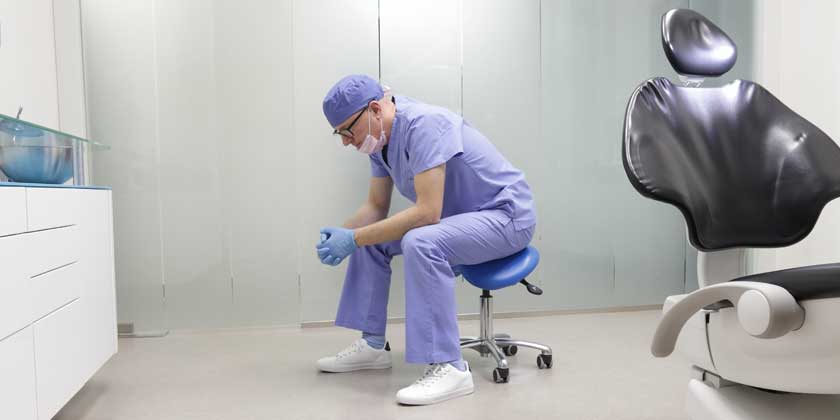Everyone deals with loneliness from time to time.
Humans are naturally social creatures, when we go long periods of time without meaningful social interaction, it wreaks absolute havoc on our mental health.
Dentistry has a well-documented history of depression, anxiety and isolation, and it’s not exactly hard to see why.
According to Dr Jeremy Cooper, dentistry is without a doubt one of the most stressful and isolating jobs out there.
"Even if you work in a group practice, you often feel a little bit lonely because you’re in a room with a nurse and a patient, so it is a bit isolated.
In a single-handed practice, like I am, you can feel very isolated.
I think you feel isolated sometimes because you’re in your own little room having to make instant decisions.
Not only that but you’re dealing with a business with issues such as staff and cash flow, unlike doctors, and with patients who can be frightened, aggressive or both – they generally don’t want to be at the dentist.
The clinical side is not easy, you have a feeling of limited time in which to complete treatment and then there has been the exponential rise in litigation coupled with an environment in which there are more regulators who are seen by the profession to be very active," he said.
Even if you are working in a practice with other dentists, it can be incredibly difficult to open up.
It’s not easy to admit that you’re feeling lonely, especially when you’re working in such a demanding profession.
You’ve got to appear in control at all times, you don’t get to problem-solve with your peers like other medical professionals and often you’re working alone, making crucial decisions that will massively impact your patient’s lives.
With all that considered, is it at all surprising that dentists are 2.5 times more likely to experience psycho-neurotic disorders than the general population?
It’s believed that feeling lonely for an extensive period of time negatively affects mental health.
So by that logic, if we can work to solve the loneliness problem in the dental industry, there’s a high chance it could negate some of the negative feelings that dentists encounter far too often.
So, let’s have a look at some effective ways we can deal with loneliness when it pops up in our professional lives.
Acknowledge your feelings
I’m sure you read this heading and rolled your eyes a bit. Acknowledging your feelings elicits the same response as when someone asks you to mow the lawn or take out the trash.
But guess what?
Both of those jobs are important, and you can’t exactly have a nice home without them.
Acknowledging that you are feeling a bit lonely lately is a huge step in fixing the problem.
It’s important to sit down and be kind to yourself, delve a bit deeper into why you’re feeling this way and realise that you work in an incredibly difficult profession and your feelings are valid.
Paying close attention to your emotions and being proactive about them in the early stages will massively improve your mental health.
If you’re not entirely sure how to navigate these feelings, it’s really worth looking into seeing a therapist.
They’re qualified experts and can help you get specific about why you’re feeling this way.
You wouldn’t recommend a patient tries to extract their own tooth, so always consider getting the help of a professional.
Schedule a weekly out-of-clinic activity with your team
Sometimes, it takes seeing your co-workers in an out-of-work setting to really help you gel and form closer friendships.
It doesn’t have to be super organised or formal, and I'm definitely not recommending that you try those awful conversation starter games.
But getting together and sharing lunch one week, or catching up for an after-work drink on a Friday can open up the doors to discussing your personal lives and not just work-related matters.
This is especially important for you.
If you’re the dentist at a practice, you can often feel like you spend your entire day instructing people or answering questions.
Allowing yourself to bond with your colleagues in an out-of-work setting and will help you form closer bonds with them and help alleviate any feelings of isolation.
Practise self-care
It’s easy to dismiss self-care as this grandiose term for eating ice cream for breakfast or spending a ridiculous amount of money on a toaster that also reads the morning news (it looked cool on the website, I swear).
But self-care is an extremely important part of managing your mental health. Self-care is the process of doing activities with the intention of improving your energy and mood while reducing stress.
There are a number of ways you can practise self-care, including:
- Exercising - social sports are a great way to meet new people
- Eat healthily
- Have a sleep routine
- Set boundaries for both you and others
- Ask others for help
- Meditate
- Journal
- Treat yourself to a nice meal
- Spend time in nature
Practising self-care has been known to give people a better capacity to manage stress, it reduces symptoms of mental health and increases resilience.
It’s definitely worth looking into if you’re feeling lonely and who knows, you might meet others that share the same self-care activities as you!
Join a community of like-minded dentists
There are many online dental communities out there, and while joining a collaborative forum where you share your cases can be fun, it can be quite unnerving to post your work online and open yourself up to criticism.
It’s even harder to form any sort of meaningful connection at in-person courses.
Often, you’re only attending a 2-day seminar and you’ve got so much learning to do that there’s not much time to actually get to know people.
When we design courses, we keep in mind that being part of a supportive and inclusive community that seeks to uplift people is one of the most important aspects.
It's genuinely why people love learning with us.
For example, if you're a part of the Fellowship in Restorative Dentistry, you have the opportunity to join other ambitious dentists and form connections that can last a lifetime.
We provide community chat spaces where you can chat about the course, but you'll also get the chance to connect with fellow dentists and bond over shared hobbies.
We've had dentists form communities around exercising, cooking and music - just to name a few.
You can see what it's all about down below.
One of our students - Stefanie Hirt from Switzerland - said it best. Here's what she thought about the community aspect of the Fellowship in Restorative Dentistry.
"At first I was a little anxious because I thought that I would be alone and that I would be really self-reliant and wouldn’t have any support, and maybe it would be really difficult to work around the world.
But I was extremely surprised that there were 60 people being in very close contact and whenever I needed support from anyone - from students, technical support, professional support - there’s always someone there for me."
If you're interested, register your interest for the 2022 intake and be a part of something special.
Header image: Dentalreview.news




